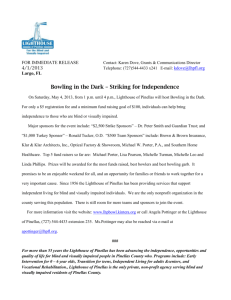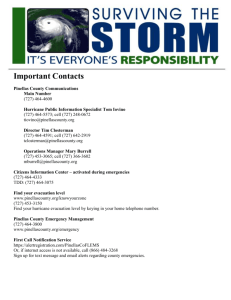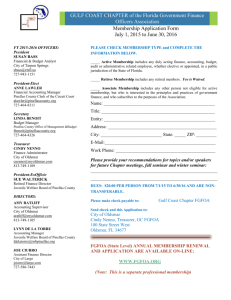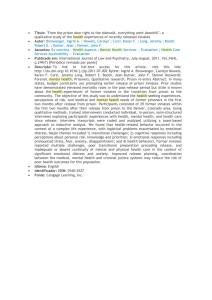PINELLAS EX OFFENDER RE ENTRY COALTION
advertisement
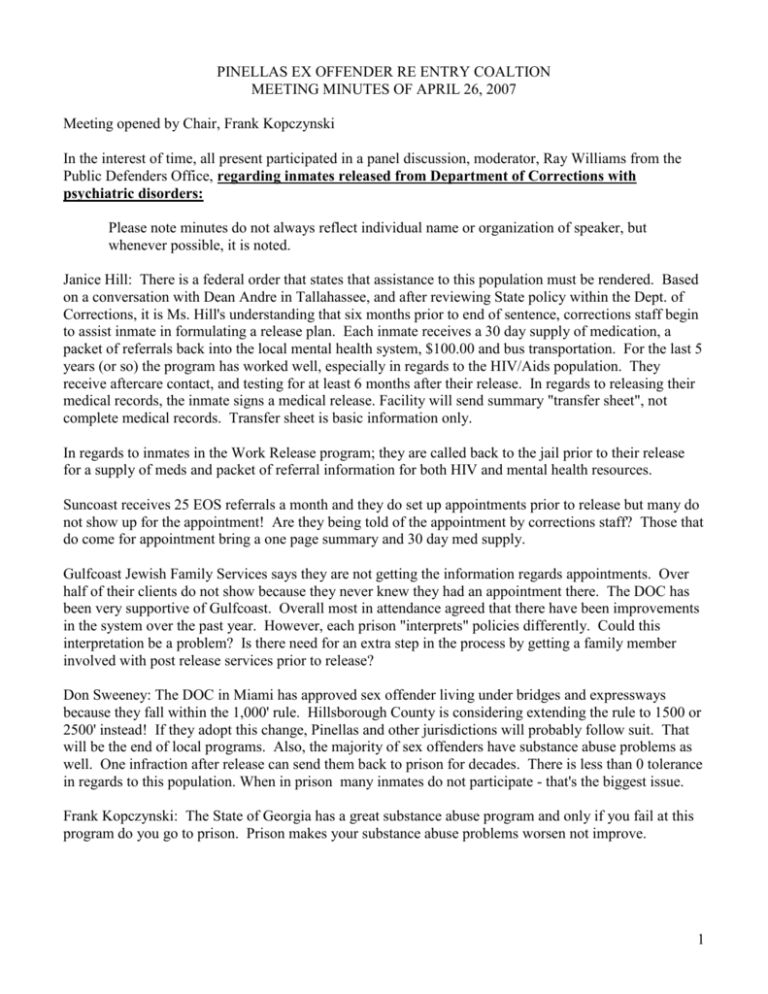
PINELLAS EX OFFENDER RE ENTRY COALTION MEETING MINUTES OF APRIL 26, 2007 Meeting opened by Chair, Frank Kopczynski In the interest of time, all present participated in a panel discussion, moderator, Ray Williams from the Public Defenders Office, regarding inmates released from Department of Corrections with psychiatric disorders: Please note minutes do not always reflect individual name or organization of speaker, but whenever possible, it is noted. Janice Hill: There is a federal order that states that assistance to this population must be rendered. Based on a conversation with Dean Andre in Tallahassee, and after reviewing State policy within the Dept. of Corrections, it is Ms. Hill's understanding that six months prior to end of sentence, corrections staff begin to assist inmate in formulating a release plan. Each inmate receives a 30 day supply of medication, a packet of referrals back into the local mental health system, $100.00 and bus transportation. For the last 5 years (or so) the program has worked well, especially in regards to the HIV/Aids population. They receive aftercare contact, and testing for at least 6 months after their release. In regards to releasing their medical records, the inmate signs a medical release. Facility will send summary "transfer sheet", not complete medical records. Transfer sheet is basic information only. In regards to inmates in the Work Release program; they are called back to the jail prior to their release for a supply of meds and packet of referral information for both HIV and mental health resources. Suncoast receives 25 EOS referrals a month and they do set up appointments prior to release but many do not show up for the appointment! Are they being told of the appointment by corrections staff? Those that do come for appointment bring a one page summary and 30 day med supply. Gulfcoast Jewish Family Services says they are not getting the information regards appointments. Over half of their clients do not show because they never knew they had an appointment there. The DOC has been very supportive of Gulfcoast. Overall most in attendance agreed that there have been improvements in the system over the past year. However, each prison "interprets" policies differently. Could this interpretation be a problem? Is there need for an extra step in the process by getting a family member involved with post release services prior to release? Don Sweeney: The DOC in Miami has approved sex offender living under bridges and expressways because they fall within the 1,000' rule. Hillsborough County is considering extending the rule to 1500 or 2500' instead! If they adopt this change, Pinellas and other jurisdictions will probably follow suit. That will be the end of local programs. Also, the majority of sex offenders have substance abuse problems as well. One infraction after release can send them back to prison for decades. There is less than 0 tolerance in regards to this population. When in prison many inmates do not participate - that's the biggest issue. Frank Kopczynski: The State of Georgia has a great substance abuse program and only if you fail at this program do you go to prison. Prison makes your substance abuse problems worsen not improve. 1 Ray Williams stated he experienced firsthand the lack of transfer sheets, lack of meds, lack of follow through with his clientele. With supervision and daily medications, this population does not need to go to jail. This diversion should happen in court prior to incarceration. It can take more than one mental health professional to make a diagnosis that is acceptable to the courts. For example: It can take three docs to agree that a person is incompetent but that person may still not meet the criteria for involuntary committal to a state hospital. Then efforts must be made to find a treatment center. If the person has no SSD, refuses to take their meds, is uncooperative, etc. it is frustrating at best. A large portion of mentally ill individuals don't realize they are sick or don't trust taking their meds. Frank Kopczynski: Who does the (PERC) contact regarding a higher level of service? Diane Lee, Tampa & Kim Reilly, Tallahassee What is desperately needed is a Mental Health Court in Pinellas and/or Hillsborough County. Sex Offender labeling must be changed! HERN has a committee working on researching changing the 2500' proposal in Hillsborough. How ever it was noted that early detection - prompt response is more effective. Using a tape measure approach accomplishes little. Why is there no Mental Health Court here? According to Ray Williams, three years ago, Ray and a group went to Tallahassee to lobby for one. You must have the support of the State Attorney's Office for this to happen. According to Ray, you don't need any additional funding and they agreed. Then two years ago, they said there was "no funding" to provide one! Stated that unlike drug court, mental health court will cost you more, as you must provide extra staffing. Luis Faustino: Mental Health Court in Sarasota works great. Every Wednesday they meet, support graduates from local programs, invite those in need to join these same treatment programs to help keep the mentally ill from languishing in jail or even worse prison. Ray Williams stated that in Florida, Pinellas County is a "magnet" that attracts needy individuals because we have the resources. Tallahassee says that under these parameters, having a mental health court here would overwhelm the court, thus the need for extra staff and that would be cost prohibitive. Existing local mental health programs are "territorial" in nature and don't want to share resources. You would need a centralized treatment facility for success. Every judge responds differently to mentally ill individuals. All officers including probation officers should attend CIT (Crisis Intervention Training), which deals specifically with mental illness response. The Regional Community Training Institute offers the programs free. The Pinellas County Jail offers a program called "Making Supervision Work For You". It is full every time the class is offered. Graduates have a certificate which they take to the judge/probation officer. No one seems to know about the program although the PCJ has repeatedly sent out the information. Why don't the other agencies know about this? We need to tighten response and improve communication within our own agencies first before trying to fix outside the box. 2 Lawyers are willing to help but they just don't know what services are out there! It was suggested that a regular insert be place in the Bar Association Newsletter which, in St. Petersburg alone, reaches 1400 attorneys. On May 3, 2007, NAMI (National Alliance for Mental Illness) meets with all mental health providers. Frank Kopczynski will be there to encourage them to advocate for a Mental Health Court. All agencies should develop contact persons in higher agencies, including Tallahassee. Colorado has a successful program; Recovering Anonymously for people addicted to pornography, different than Sex, Love and Addiction offered in Pinellas. For local mental health issues at the Pinellas County Jail, email Rebecca Reynal at rebecca.wolf-reynal@mail.dc.state.us (please note this email address will be clarified by chairperson.) It was agree upon by the members of the Coalition present to invite Diane Lee to next PERC meeting. End of panel discussion. Other Business: Chair asked assemblage to review item VI on agenda and email Frank with your top favorites for future topics. Treasurer Report - Mike Jalazzo: Approximately $36,000 in Dept. of Labor account, $70,000 in Pinellas Re Entry Program account left for fiscal year. New employees A.J. Murphy and Zachary White were introduced. Through April 24, A.J. has seen 238 clients, followed up with 63, for a total of 301 sessions, and 26 classes. Mike is in the process of writing for a Dept. of Labor grant for $60,000 and will continue to look for additional funding sources. Success Stories: Julius Baker - Worknet - congratulated for setting a fair workplace environment. Gavin Anderson - Addiction treatment in the jail is needed - success happens everyday! Don Sweeney - The Palace Mobile Home Park has 75 sex offenders living there. The Palace offers programs for them, they need A.A., Frank to provide contact. Nancy Morais is looking at trailer parks in other areas of the state. Zachary White: Boley has homeless prevention program available to pay for one month rent. Rebecca Reynal - Resources are needed quickly! Ladonna Duhon has been promoted to Suncoast Goodwill Assistant Program Manager Minnie Lee: note new name of: Pinellas County Department of Health and Human Services Bev Roberts: told horror story about ex offender who was violated because he was 15 minutes late due to City bus being late. Lost job, lost apartment etc. As an employment specialist this is heartbreaking because employers become reluctant to hire ex offenders. A.J. Murphy: We need to develop a transitional housing program to be a model for the State. Luis Faustino: Diocese of Venice has 15,000 inmates - everyone want to come to Pinellas! Frank Kopczynski: Dade County has more mentally ill population than any other county in Florida and their services are the worst in the State. 3 Tom Armstrong: sex offender, out for 8 months, living at Palace MHP. Has his own business with a fulltime employee. Is now offering free ESL classes at the Palace every Thursday from 7-9 p.m. Tom was a high school teacher and also taught ESL in prison and has a full curriculum. His long term goal is to help those who cannot defend themselves in the "system" due to language barriers. Ray Williams: Effective 6/1/07, there will be a homeless shelter available for females only who have mental disorders. Ray will give Frank Kopczynski all information for dissemination. Bob Dillinger has assigned Ray to also work with Baker Act cases. Frank Kopczynski: PERC has filed an application with Charity Cars to provide cars to charity to the Coalition’s clients that qualify and also created a revenue string with "GIVE" Inc. where a portion of the sale goes to PERC. No further business. Meeting Adjourned. 4
